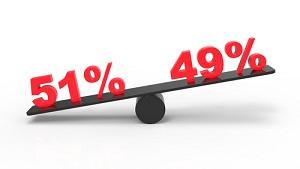 When a person is injured in a car accident, by a defective product, or by any other means, he or she will often be entitled to seek compensation from the party or parties whose actions or negligence ultimately caused the injuries. Besides not being injured at all, the best-case scenario for such a claimant would be the existence of clear and convincing evidence of wrongdoing on the part of the defendant(s), and that the actions were completely responsible for the resulting harm.
When a person is injured in a car accident, by a defective product, or by any other means, he or she will often be entitled to seek compensation from the party or parties whose actions or negligence ultimately caused the injuries. Besides not being injured at all, the best-case scenario for such a claimant would be the existence of clear and convincing evidence of wrongdoing on the part of the defendant(s), and that the actions were completely responsible for the resulting harm.
However, in the real world, select few personal injury cases are that simple. More commonly, actions or negligence on the part of the injured person are at least partially to blame, and it is often left to a jury to determine the extent of that responsibility. The idea of comparative negligence, sometimes called comparative fault, can greatly impact an injured party’s ability to recover personal injury damages, depending upon the nature of the situation.
Pure Contributory Negligence vs. Comparative Negligence
Several states and the District of Columbia maintain an extremely strict standard for liability in a personal injury case. Alabama, Maryland, Virginia, and Washington, D.C., utilize the rule of pure contributory negligence which prevents the claimant from recovering damages if he or she is found to be even 1 percent at fault. While the rule is possible to overcome, the standard bars recovery in many situations in those jurisdictions.
Comparative negligence, conversely, permits recovery by the claimant even when he or she is partially at fault. The awarded damages, however, are to be reduced by the percentage of fault attributed to the claimant’s actions or negligence. In the state of Connecticut, if the claimant is found to be 51 percent or more at fault, then he or she will not be permitted to recover damages. This standard is known as modified comparative negligence and 51 percent rules, along with very similar 50 percent rules, are in place in 33 states including Connecticut. The remaining states permit recovery by a claimant found to be 99 percent at-fault, but, of course, counter-claims would be likely in such a case.
Comparative Negligence Example
Consider a situation in which you are walking along the sidewalk about to cross the street a busy intersection. You are looking down at your phone as you start to cross, unaware that the light facing your direction is red. Meanwhile, a car with the green light enters the intersection, being driven by a person in the middle of sending a text message, which is against the law in Connecticut. Distracted, the driver hits you, and the damages associated with your injury are calculated by the jury to be $100,000.
Despite the actions of the distracted driver, the jury finds that your crossing against the light constituted 15 percent of the fault for the accident. Your collection would be reduced by 15 percent, and you would be entitled to $85,000. This is a purely hypothetical example, with numbers chosen for ease of calculation, and is not intended to represent the actual damages or comparative fault associated with a real pedestrian accident.
Legal Help for Connecticut Injury Claims
If you have been injured in an accident and are concerned that your own negligence may jeopardize your ability to collect the compensation you need, contact an experienced Hartford, CT personal injury attorney. We will carefully investigate the circumstances of your case and help you understand your available options or avenues for recovery. Call 860-290-8690 today to schedule your no-obligation consultation at the Woolf & Ross Law Firm, LLC.
Sources:
http://www.claimsjournal.com/news/national/2013/09/05/235755.htm
http://www.jud.ct.gov/ji/Civil/part3/3.5-4.htm
https://www.cga.ct.gov/2011/pub/chap925.htm#Sec52-572h.htm
 50 Founders Plaza
50 Founders Plaza

